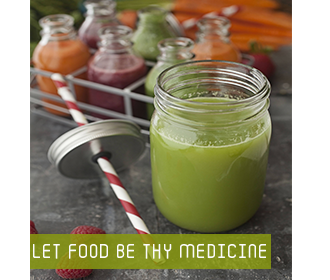Acne is one of the most multi-factorial conditions out there, and it certainly makes a lot of people miserable. It can strike during those awkward years of puberty all the way up to your forties and fifties. Doctors may prescribe a strict regimen of antibiotics, topicals, or stronger medications to combat acne. However, there is a gentle approach that can be used alone or in conjunction with allopathic treatments: nutrition.
We’ve all heard the (now debunked) myth that chocolate causes acne, but did you know that sugar can be a contributor to acne? In a randomized control trial, it was found that a <a href=”http://ajcn.nutrition.org/content/86/1/107.short” target=”_blank”>low-glycemic diet can help improve symptoms of acne</a>. Replacing foods that are high on glycemic load, like refined grains, with low-carbohydrate foods such as leafy green vegetables, bell peppers, whole grains, berries, and apples may help reduce symptoms of acne, which means that while chocolate might not cause acne, the sugars in it are probably contributing to it.
There have been some studies that show a weak correlation between acne and dairy, especially with high consumption of<a href=”http://www.dairynutrition.ca/facts-fallacies/health-concerns/acne-nutrition-and-milk-product” target=”_blank”> skim milk</a>. Interestingly, fermented dairy (for example, kafir), showed to have an <a href=”http://www.ncbi.nlm.nih.gov/pubmed/20692602″ target=”_blank”>anti-inflammatory effect and decreased lesion count by 23.1% after 12 weeks.</a>
Additionally, seems to have a connection with acne. A 2007 study found that acne sufferers had <a href=”http://www.jtad.org/2007/3/jtad71302a.pdf” target=”_blank”>lower levels of serum zinc </a>than non-acne sufferers. Zinc can be found in:
<ul>
<li>Liver</li>
<li>Beef</li>
<li>Beans and legumes</li>
<li>Oysters</li>
<li>Fish</li>Acne is one of the most multi-factorial conditions out there, and it certainly makes a lot of people miserable. It can strike during those awkward years of puberty all the way up to your forties and fifties. Doctors may prescribe a strict regimen of antibiotics, topicals, or stronger medications to combat acne. However, there is a gentle approach that can be used alone or in conjunction with allopathic treatments: nutrition.
We’ve all heard the (now debunked) myth that chocolate causes acne, but did you know that sugar can be a contributor to acne? In a randomized control trial, it was found that a low-glycemic diet can help improve symptoms of acne. Replacing foods that are high on glycemic load, like refined grains, with low-carbohydrate foods such as leafy green vegetables, bell peppers, whole grains, berries, and apples may help reduce symptoms of acne, which means that while chocolate might not cause acne, the sugars in it are probably contributing to it.
There have been some studies that show a weak correlation between acne and dairy, especially with high consumption of skim milk. Interestingly, fermented dairy (for example, kafir), showed to have an anti-inflammatory effect and decreased lesion count by 23.1% after 12 weeks.
Additionally, seems to have a connection with acne. A 2007 study found that acne sufferers had lower levels of serum zinc than non-acne sufferers. Zinc can be found in:
- Liver
- Beef
- Beans and legumes
- Oysters
- Fish
While it can be found in some plant sources, zinc is much more bioavailable in animal sources.
Allergies also seem to be a common culprit: allergies increase inflammation in the body, which may be related to acne. Avoiding foods that you know you have intolerances to as well as testing what works with elimination may help with acne. Common culprits include eggs, dairy, wheat, gluten, peanuts, and tree nuts.
We can also help fight acne in more natural ways by using anti-inflammatory and antimicrobial oils that are non- comedogenic (pore-clogging). For example, neem oil (available at health food stores), emu oil, and dilute tea tree oils can be beneficial in fighting acne, but coconut oil and cocoa butter are best left to dry elbows and knees: they can definitely clog pores.
I would also be aware that many natural remedies can be harsh on the skin. For example, baking soda should never be used on the skin as it alters the pH, leaving it more prone to infectious outbreaks. Lemon juice is another popular home remedy that is not safe as it is very acidic, causing similar issues to the baking soda, and alarmingly, on exposure to sunlight can cause chemical burns.
Always make sure that what you’re putting on your skin is not only low in potentially irritating chemicals but also safe and gentle. Remember, while acne is in large part due to genetics and hormonal imbalances/changes, nutrition and environmental factors are also important in keeping your skin healthy.
</ul>
While it can be found in some plant sources, zinc is much more bioavailable in animal sources.
Allergies also seem to be a common culprit: allergies increase inflammation in the body, which may be related to acne. Avoiding foods that you know you have intolerances to as well as testing what works with elimination may help with acne. Common culprits include eggs, dairy, wheat, gluten, peanuts, and tree nuts.
We can also help fight acne in more natural ways by using anti-inflammatory and antimicrobial oils that are <strong>non- comedogenic</strong> (pore-clogging). For example, neem oil (available at health food stores), emu oil, and dilute tea tree oils can be beneficial in fighting acne, but coconut oil and cocoa butter are best left to dry elbows and knees: they can definitely clog pores.
I would also be aware that many natural remedies can be harsh on the skin. For example, baking soda should never be used on the skin as it alters the pH, leaving it <a href=”http://www.sebamedbikeday.de/fileadmin/user_upload/pdf/Studien/Saeuremantelkonzept/1.06.pdf”>more prone to infectious outbreaks</a>. Lemon juice is another popular home remedy that is <strong>not safe</strong> as it is very acidic, causing<a href=”http://www.karger.com/Article/FullText/66140″> similar issues</a> to the baking soda, and alarmingly, on exposure to sunlight can <a href=”http://abcnews.go.com/Health/limes-blamed-girls-degree-burns/story?id=20164612″>cause chemical burns</a>.
Always make sure that what you’re putting on your skin is not only low in potentially irritating chemicals but also safe and gentle. Remember, while acne is in large part due to genetics and hormonal imbalances/changes, nutrition and environmental factors are also important in keeping your skin healthy.









